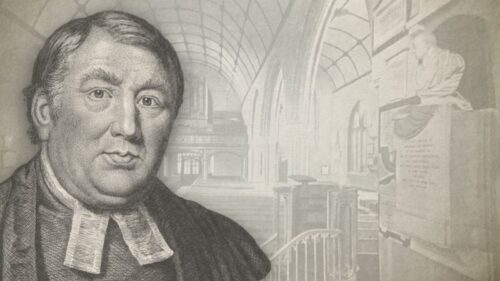
December 22—Morning Devotion
“Having made known unto us the mystery of his will, according to his good pleasure, which he hath purposed in himself.”—Ephesians 1:9
My soul, pause over these volumes of divine truth for they are not as so many simple words, but contain vast volumes indeed, and such as a whole eternity will not afford space to read over and finish. The first is a large one indeed—even the mystery of God’s will namely, the mystery of redemption, originating in the divine mind, before all worlds. And this is not the smallest part of it, that it should be made known in any degree or measure to thee, my soul, a poor creature of a day, and that day, a day of nothing but sin. The second volume in this vast subject is another precious part of the same glorious truth; namely, that this mercy of God in Christ is the sole result of God’s good pleasure. No foresight, no merit, no pretensions of thine, my soul; no, nor the merits of arch-angels, becoming in the least the cause. For though a gracious God hath taken occasion to make a glorious display of the depths of his grace, from the depths of man’s ruin; yet it was not our state, but his good pleasure, which laid the foundation of our recovery by Jesus Christ. And the third volume in this stupendous subject is, that he that planned, executed and finished it. As none but infinite wisdom could purpose, so none but infinite power could accomplish. Pause, my soul, and contemplate the vast mercy! It comes from God in Christ, as the first cause; and reverts back again to God in Christ, as the final end. Hallelujah.
Robert Hawker (1753-1827) was an Anglican (High-Calvinist) preacher who served as Vicar of Charles Church, Plymouth. John Hazelton wrote of him:
“The prominent features…in Robert Hawker's testimony…was the Person of Christ….Dr. Hawker delighted to speak of his Lord as "My most glorious Christ.” What anxious heart but finds at times in the perusal of the doctor's writings a measure of relief, a softening, and a mellowing? an almost imperceptible yet secret and constraining power in leading out of self and off from the misery and bondage of the flesh into a contemplation of the Person and preciousness of Christ as "the chiefest among ten thousand and the altogether lovely." Christ and Him crucified was emphatically the burden of his song and the keynote of his ministry. He preached his last sermon in Charles Church on March 18th, 1827, and on April 6th he died, after being six years curate and forty-three years vicar of the parish. On the last day of his life he repeated a part of Ephesians 1, from the 6th to the 12th verses, and as he proceeded he enlarged on the verses, but dwelt more fully on these words: "To the praise of His glory Who first trusted in Christ." He paused and asked, "Who first trusted in Christ?" And then made this answer: "It was God the Father Who first trusted in Christ."
Robert Hawker on the Biblical Covenants (Complete)
Robert Hawker's Poor Man's Morning Portions





